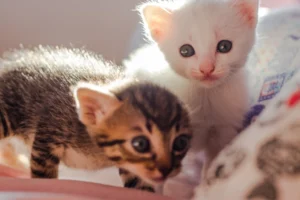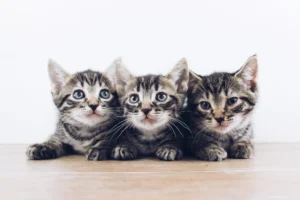Have you ever wondered why we call these furry creatures ‘cats’ and not ‘kats’? Let’s explore the reasoning behind this interesting naming convention.
Origins of the Word ‘Cat’
Have you ever stopped to wonder why we call these furry creatures ‘cats’ and not ‘kats’? Let’s dive into the fascinating origins of the word ‘cat.’
The word ‘cat’ can be traced back to the Old English word ‘catt,’ which is thought to have been borrowed from the Latin word ‘cattus.’ It’s interesting to note that the word ‘cattus’ may have roots in the Egyptian word ‘caute,’ which means ‘to scratch.’ This connection highlights the long history of cats as skilled hunters and feared predators.
Over time, the word ‘cat’ evolved through various languages and dialects, such as Middle English ‘catte’ and Old French ‘chat,’ before settling on its current form. Despite these linguistic transformations, the essence of the word ‘cat’ has remained consistent in referring to our beloved feline companions.
Evolution of the Name
While ‘cat’ may seem like a simple and straightforward name for our feline friends, its evolution tells a deeper story of cultural exchange and linguistic development.
Throughout history, cats have held a special place in human society, revered in some cultures and reviled in others. The enduring popularity of the name ‘cat’ can be attributed to its versatility and ease of pronunciation across different languages and regions. This adaptability has allowed the name to transcend borders and time periods, ensuring that ‘cat’ remains a universally recognized term for these enigmatic creatures.
Interestingly, the name ‘cat’ has also inspired a plethora of idioms and expressions in various languages, highlighting the enduring fascination and appeal of these mysterious animals. From ‘curiosity killed the cat’ to ‘cat’s whiskers,’ our language is peppered with references to these captivating creatures.
So, the next time you call out to your feline friend, remember the rich history and evolution behind the simple yet powerful name ‘cat.’ After all, they deserve every ounce of respect and admiration bestowed upon them throughout the ages.
Linguistic Influences
The name ‘cat’ can be attributed to linguistic influences that have shaped the English language over centuries. The word ‘cat’ has its origins in the Old English word ‘catt,’ which was derived from the Late Latin word ‘cattus.’ This Latin term was influenced by the earlier Greek word ‘katta’ and the Egyptian word ‘caute.’
The evolution of the name ‘cat’ shows a blend of various languages and cultures, each contributing to the development of the word we use today. The phonetic shifts and linguistic adaptations over time have solidified ‘cat’ as the common term for this beloved animal, distinguishing it from other variations like ‘kat.’
Interestingly, the linguistic roots of ‘cat’ have played a significant role in its widespread adoption and acceptance, illustrating how language shapes our understanding and perception of the world around us.
Cultural Significance
The name ‘cat’ holds a deep cultural significance that transcends linguistic boundaries and has become ingrained in societies worldwide. Cats have been revered and cherished in various cultures throughout history, symbolizing different attributes such as mystery, independence, and agility.
In ancient Egypt, for example, cats were highly esteemed and associated with the goddess Bastet, who represented protection, fertility, and motherhood. This cultural reverence for cats helped solidify their place in society and influenced the way they were viewed and named.
The widespread cultural significance of the name ‘cat’ has led to its universal recognition and adoption, with the term evoking a range of emotions and associations in different cultures. From literature to art to superstitions, the cultural importance of cats and their name continues to shape our perceptions and interactions with these fascinating creatures.
Additional Insight: Why ‘Cat’ and Not ‘Kat’?
While ‘kat’ may seem like a plausible alternative spelling for the feline creature, the linguistic evolution and cultural connotations embedded in the name ‘cat’ have solidified its place in language and society. The specific phonetic and historical influences behind ‘cat’ have contributed to its universal recognition and acceptance, making it the preferred term for referring to our beloved feline companions.
Common Misconceptions
Many people believe that cats were originally called “kats” and that the spelling changed over time. However, this is simply not true. The word “cat” has been used to describe these furry creatures for centuries, dating back to the Old English word “catt.” So, the name “cat” has actually been around longer than most people realize. Another common misconception is that the name “cat” was influenced by the animal’s sound, like “meow” or “purr.” While this may seem logical, the word “cat” actually comes from a completely different origin. It’s interesting how history and language can sometimes surprise us with their twists and turns.
Interesting Facts
- The term “cat” is believed to have originated from the Latin word “cattus.”
- Cats were highly revered in ancient Egypt, where they were worshiped as sacred animals.
- The collective noun for a group of cats is a “clowder” or a “glaring.”
- Cats have a special reflective layer behind their retinas called the tapetum lucidum, which enhances their night vision.
- Cat breeds are often named after their characteristics, such as the Siamese cats named after Siam (now Thailand).
These fascinating facts shed light on the intriguing history and naming of our beloved feline friends.
Cat vs. Kat
Have you ever wondered why we call them ‘cats’ and not ‘kats’? The term ‘cat’ dates back to Old English, where they were referred to as ‘cattas.’ Over time, the pronunciation evolved, and ‘cat’ became the preferred term. Interestingly, ‘kat’ is used in various other languages such as Dutch and Afrikaans to refer to these beloved feline creatures. However, in English, ‘cat’ has stuck as the commonly used term, reflecting the rich history and evolution of language.
Fun Trivia
- Did you know that a group of cats is called a ‘clowder’? This term originates from the Middle English word ‘clodder,’ meaning ‘to clot or huddle together.’
- Cats can make over 100 different sounds, while dogs can only make about 10. Their meows, purrs, and chirps are all ways they communicate with their owners.
- The world’s oldest known pet cat was found in a 9,500-year-old grave on the Mediterranean island of Cyprus. This discovery suggests that cats have been living alongside humans for thousands of years.
- Cats have a specialized collarbone that allows them to always land on their feet when they fall – a phenomenon known as the ‘righting reflex.’
- The most popular breed of domestic cat in the United States is the Persian, known for its long, flowing coat and sweet temperament.
Whether you prefer calling them ‘cats’ or ‘kats,’ these fascinating feline companions have captured the hearts of many throughout history with their unique personalities and endearing behaviors.
Alex, a passionate animal lover, has experience in training and understanding animal behavior. As a proud pet parent to two dogs and three cats, he founded AnimalReport.net to share insights from animal experts and expand his knowledge of the animal kingdom.




